General Ethics and Principles As Per APES 110 2018
VerifiedAdded on 2023/06/12
|10
|1700
|236
AI Summary
This assignment discusses the objectivity of professional members, their responsibility, code of conduct, fundamental principles, compliance, etc. and critically examines different scenarios where auditors' responsibility or fundamental principles have been violated due to lack on their part.
Contribute Materials
Your contribution can guide someone’s learning journey. Share your
documents today.
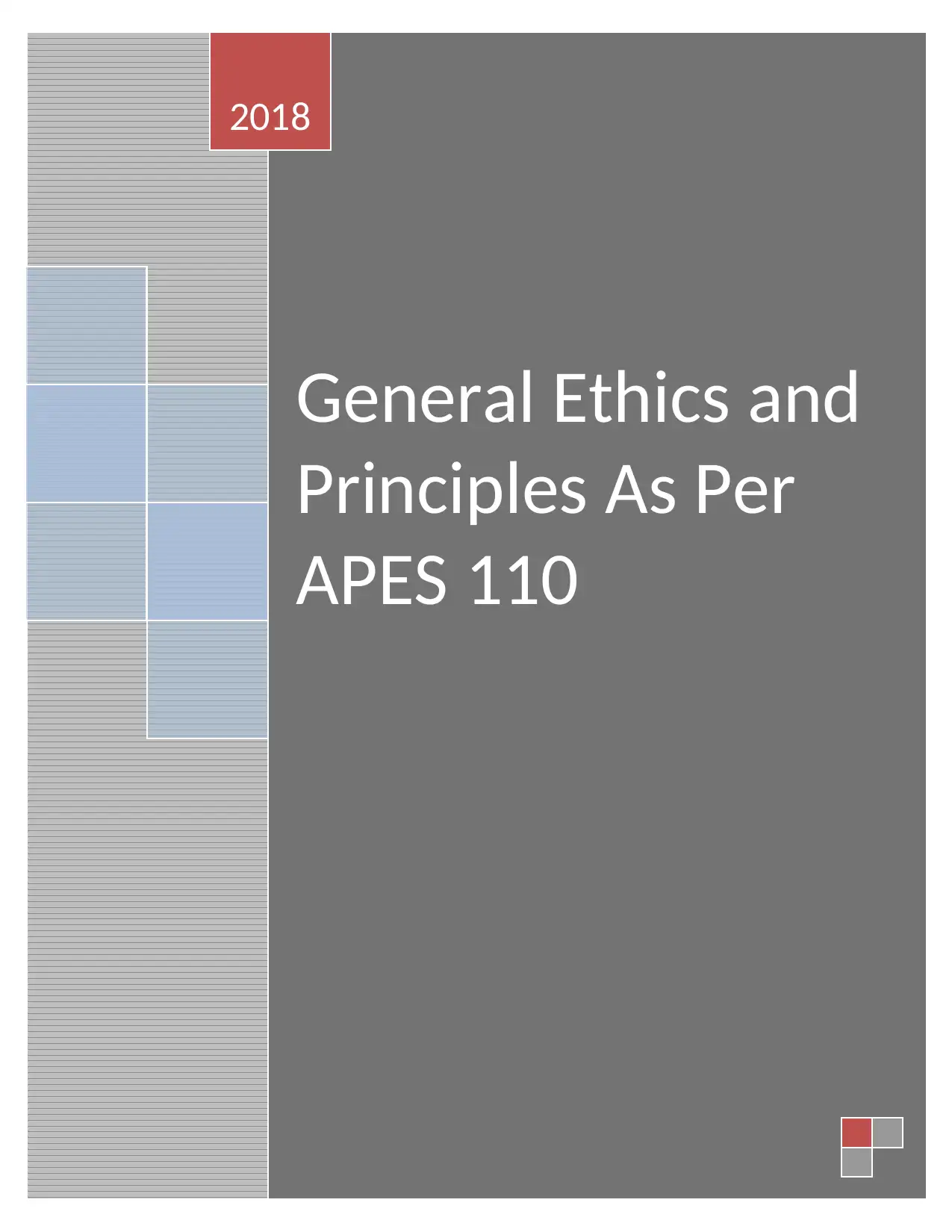
General Ethics and
Principles As Per
APES 110
2018
Principles As Per
APES 110
2018
Secure Best Marks with AI Grader
Need help grading? Try our AI Grader for instant feedback on your assignments.
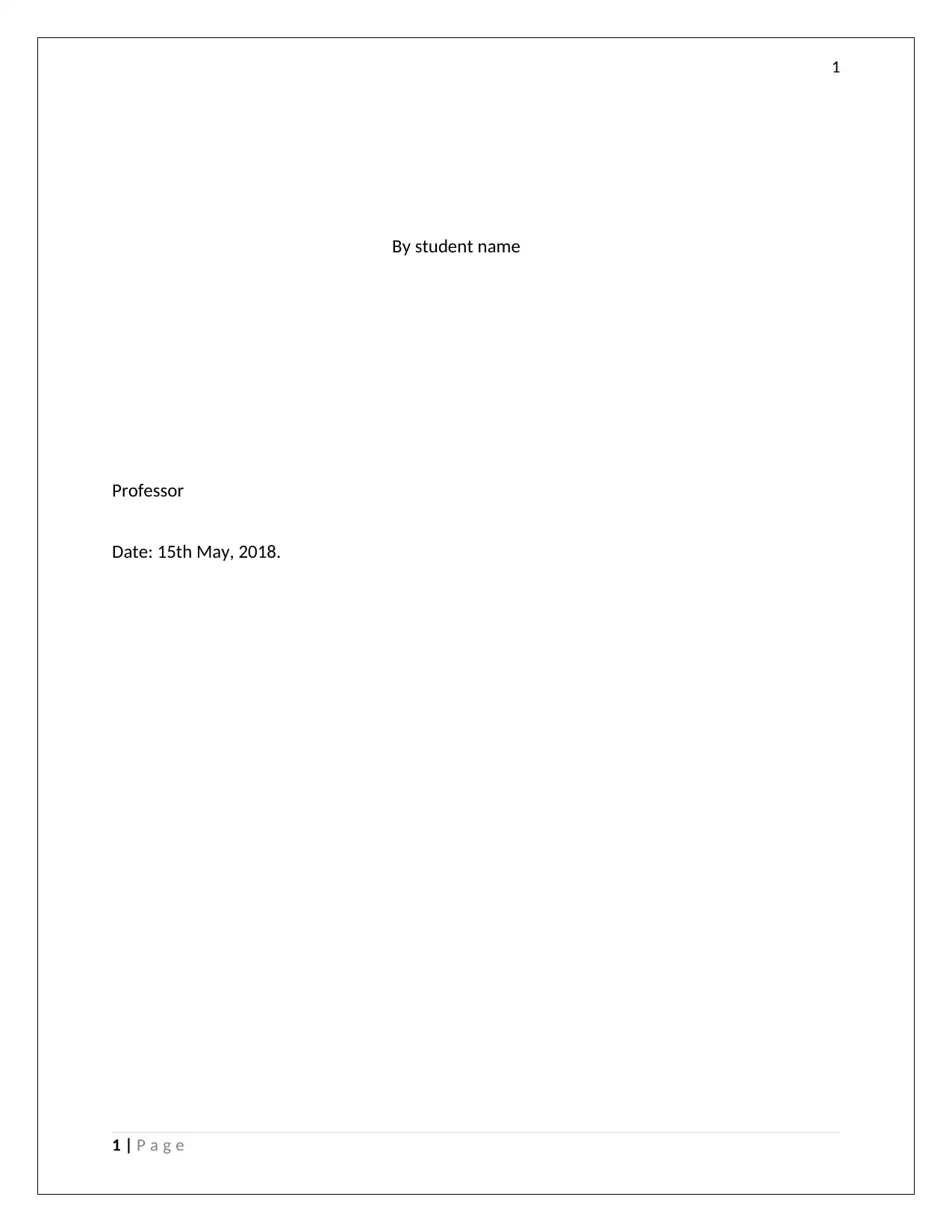
1
By student name
Professor
Date: 15th May, 2018.
1 | P a g e
By student name
Professor
Date: 15th May, 2018.
1 | P a g e
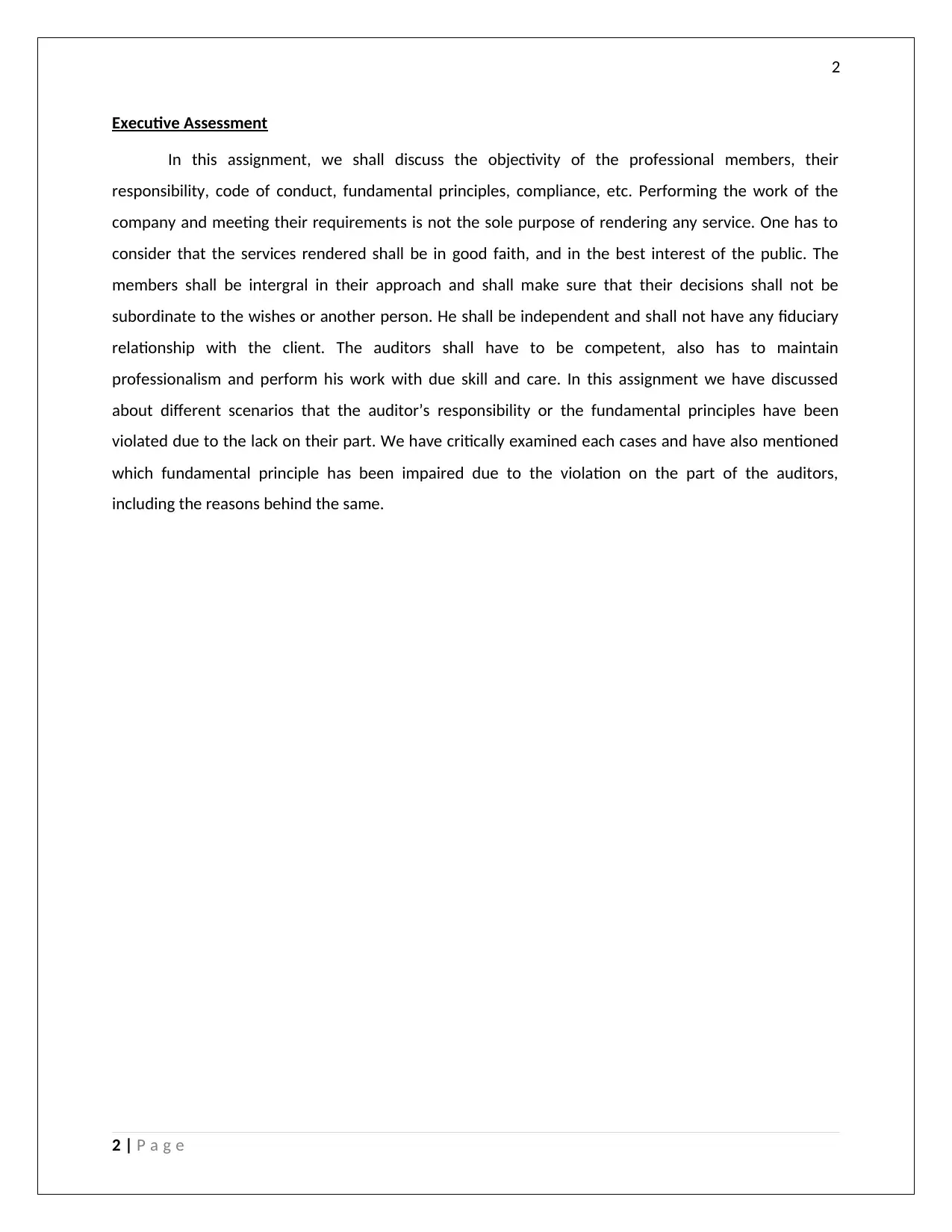
2
Executive Assessment
In this assignment, we shall discuss the objectivity of the professional members, their
responsibility, code of conduct, fundamental principles, compliance, etc. Performing the work of the
company and meeting their requirements is not the sole purpose of rendering any service. One has to
consider that the services rendered shall be in good faith, and in the best interest of the public. The
members shall be intergral in their approach and shall make sure that their decisions shall not be
subordinate to the wishes or another person. He shall be independent and shall not have any fiduciary
relationship with the client. The auditors shall have to be competent, also has to maintain
professionalism and perform his work with due skill and care. In this assignment we have discussed
about different scenarios that the auditor’s responsibility or the fundamental principles have been
violated due to the lack on their part. We have critically examined each cases and have also mentioned
which fundamental principle has been impaired due to the violation on the part of the auditors,
including the reasons behind the same.
2 | P a g e
Executive Assessment
In this assignment, we shall discuss the objectivity of the professional members, their
responsibility, code of conduct, fundamental principles, compliance, etc. Performing the work of the
company and meeting their requirements is not the sole purpose of rendering any service. One has to
consider that the services rendered shall be in good faith, and in the best interest of the public. The
members shall be intergral in their approach and shall make sure that their decisions shall not be
subordinate to the wishes or another person. He shall be independent and shall not have any fiduciary
relationship with the client. The auditors shall have to be competent, also has to maintain
professionalism and perform his work with due skill and care. In this assignment we have discussed
about different scenarios that the auditor’s responsibility or the fundamental principles have been
violated due to the lack on their part. We have critically examined each cases and have also mentioned
which fundamental principle has been impaired due to the violation on the part of the auditors,
including the reasons behind the same.
2 | P a g e
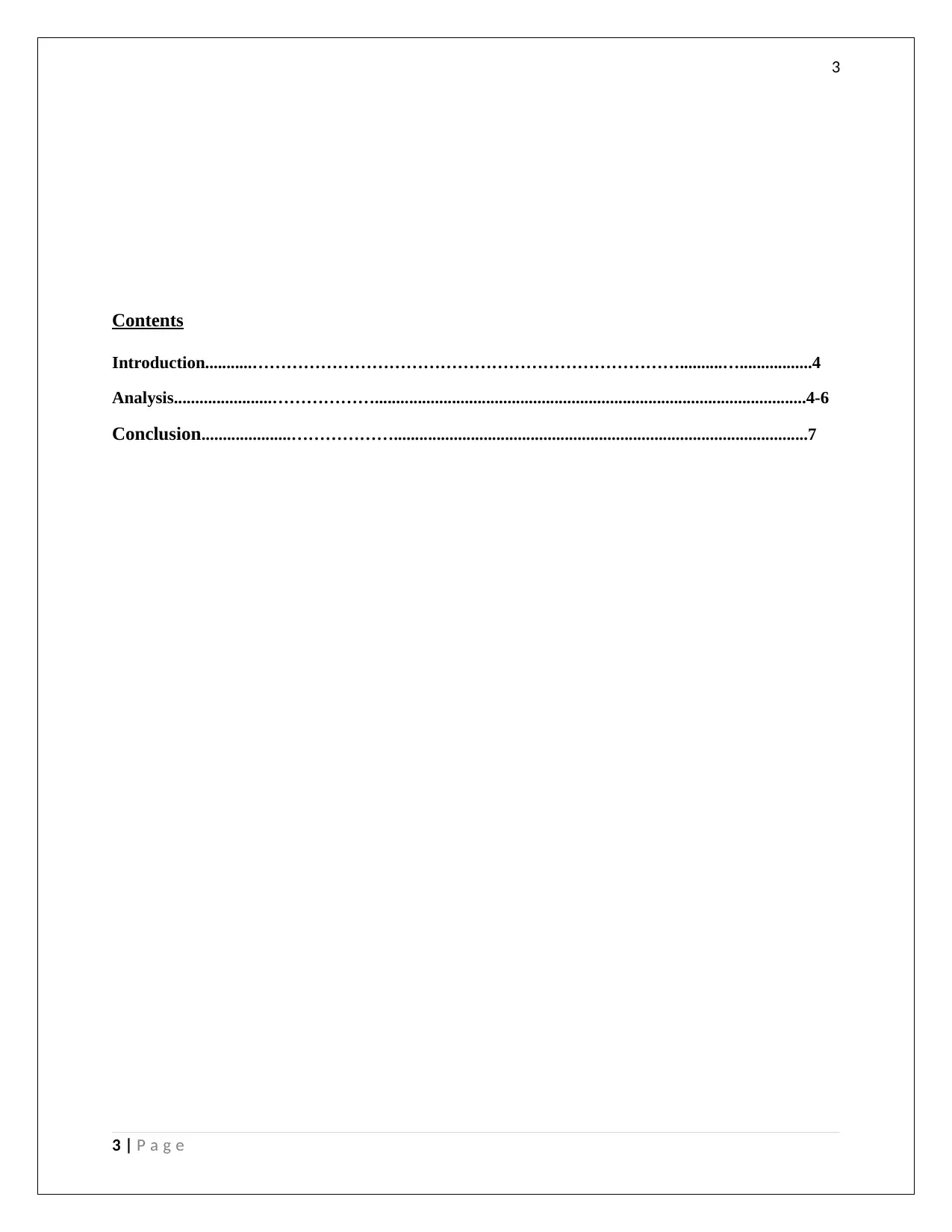
3
Contents
Introduction...........…………………………………………………………………..........….................4
Analysis.......................……………….....................................................................................................4-6
Conclusion.....................……………….................................................................................................7
3 | P a g e
Contents
Introduction...........…………………………………………………………………..........….................4
Analysis.......................……………….....................................................................................................4-6
Conclusion.....................……………….................................................................................................7
3 | P a g e
Secure Best Marks with AI Grader
Need help grading? Try our AI Grader for instant feedback on your assignments.
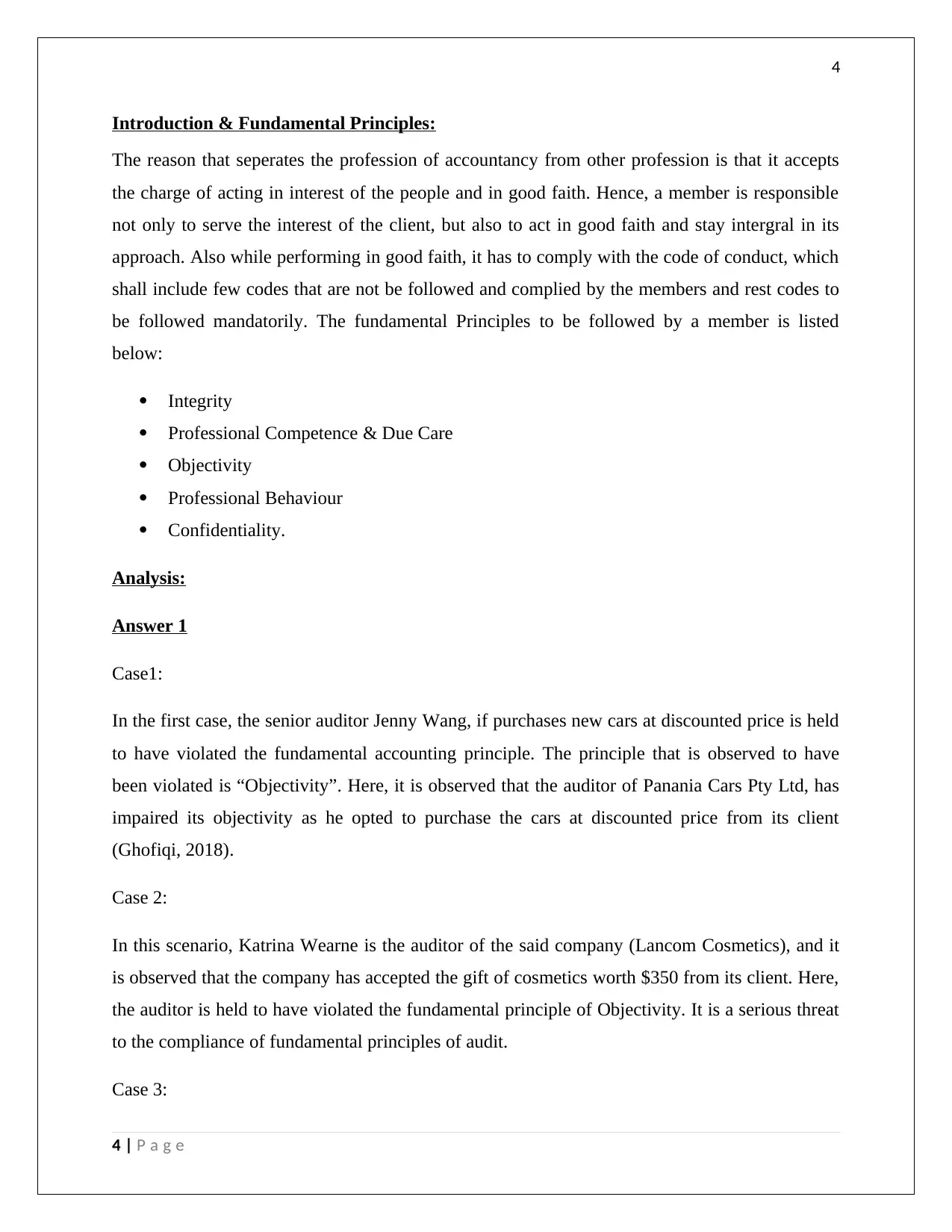
4
Introduction & Fundamental Principles:
The reason that seperates the profession of accountancy from other profession is that it accepts
the charge of acting in interest of the people and in good faith. Hence, a member is responsible
not only to serve the interest of the client, but also to act in good faith and stay intergral in its
approach. Also while performing in good faith, it has to comply with the code of conduct, which
shall include few codes that are not be followed and complied by the members and rest codes to
be followed mandatorily. The fundamental Principles to be followed by a member is listed
below:
Integrity
Professional Competence & Due Care
Objectivity
Professional Behaviour
Confidentiality.
Analysis:
Answer 1
Case1:
In the first case, the senior auditor Jenny Wang, if purchases new cars at discounted price is held
to have violated the fundamental accounting principle. The principle that is observed to have
been violated is “Objectivity”. Here, it is observed that the auditor of Panania Cars Pty Ltd, has
impaired its objectivity as he opted to purchase the cars at discounted price from its client
(Ghofiqi, 2018).
Case 2:
In this scenario, Katrina Wearne is the auditor of the said company (Lancom Cosmetics), and it
is observed that the company has accepted the gift of cosmetics worth $350 from its client. Here,
the auditor is held to have violated the fundamental principle of Objectivity. It is a serious threat
to the compliance of fundamental principles of audit.
Case 3:
4 | P a g e
Introduction & Fundamental Principles:
The reason that seperates the profession of accountancy from other profession is that it accepts
the charge of acting in interest of the people and in good faith. Hence, a member is responsible
not only to serve the interest of the client, but also to act in good faith and stay intergral in its
approach. Also while performing in good faith, it has to comply with the code of conduct, which
shall include few codes that are not be followed and complied by the members and rest codes to
be followed mandatorily. The fundamental Principles to be followed by a member is listed
below:
Integrity
Professional Competence & Due Care
Objectivity
Professional Behaviour
Confidentiality.
Analysis:
Answer 1
Case1:
In the first case, the senior auditor Jenny Wang, if purchases new cars at discounted price is held
to have violated the fundamental accounting principle. The principle that is observed to have
been violated is “Objectivity”. Here, it is observed that the auditor of Panania Cars Pty Ltd, has
impaired its objectivity as he opted to purchase the cars at discounted price from its client
(Ghofiqi, 2018).
Case 2:
In this scenario, Katrina Wearne is the auditor of the said company (Lancom Cosmetics), and it
is observed that the company has accepted the gift of cosmetics worth $350 from its client. Here,
the auditor is held to have violated the fundamental principle of Objectivity. It is a serious threat
to the compliance of fundamental principles of audit.
Case 3:
4 | P a g e
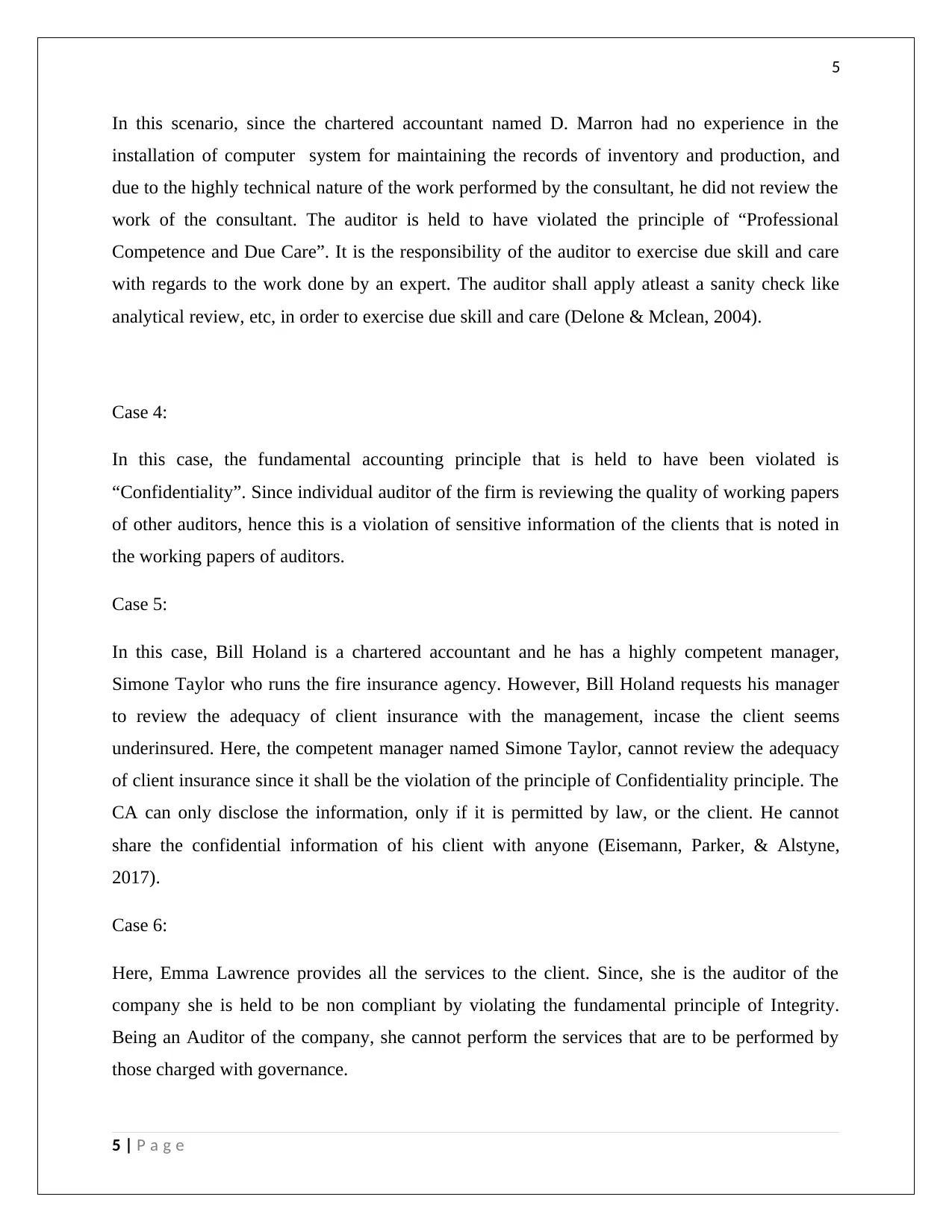
5
In this scenario, since the chartered accountant named D. Marron had no experience in the
installation of computer system for maintaining the records of inventory and production, and
due to the highly technical nature of the work performed by the consultant, he did not review the
work of the consultant. The auditor is held to have violated the principle of “Professional
Competence and Due Care”. It is the responsibility of the auditor to exercise due skill and care
with regards to the work done by an expert. The auditor shall apply atleast a sanity check like
analytical review, etc, in order to exercise due skill and care (Delone & Mclean, 2004).
Case 4:
In this case, the fundamental accounting principle that is held to have been violated is
“Confidentiality”. Since individual auditor of the firm is reviewing the quality of working papers
of other auditors, hence this is a violation of sensitive information of the clients that is noted in
the working papers of auditors.
Case 5:
In this case, Bill Holand is a chartered accountant and he has a highly competent manager,
Simone Taylor who runs the fire insurance agency. However, Bill Holand requests his manager
to review the adequacy of client insurance with the management, incase the client seems
underinsured. Here, the competent manager named Simone Taylor, cannot review the adequacy
of client insurance since it shall be the violation of the principle of Confidentiality principle. The
CA can only disclose the information, only if it is permitted by law, or the client. He cannot
share the confidential information of his client with anyone (Eisemann, Parker, & Alstyne,
2017).
Case 6:
Here, Emma Lawrence provides all the services to the client. Since, she is the auditor of the
company she is held to be non compliant by violating the fundamental principle of Integrity.
Being an Auditor of the company, she cannot perform the services that are to be performed by
those charged with governance.
5 | P a g e
In this scenario, since the chartered accountant named D. Marron had no experience in the
installation of computer system for maintaining the records of inventory and production, and
due to the highly technical nature of the work performed by the consultant, he did not review the
work of the consultant. The auditor is held to have violated the principle of “Professional
Competence and Due Care”. It is the responsibility of the auditor to exercise due skill and care
with regards to the work done by an expert. The auditor shall apply atleast a sanity check like
analytical review, etc, in order to exercise due skill and care (Delone & Mclean, 2004).
Case 4:
In this case, the fundamental accounting principle that is held to have been violated is
“Confidentiality”. Since individual auditor of the firm is reviewing the quality of working papers
of other auditors, hence this is a violation of sensitive information of the clients that is noted in
the working papers of auditors.
Case 5:
In this case, Bill Holand is a chartered accountant and he has a highly competent manager,
Simone Taylor who runs the fire insurance agency. However, Bill Holand requests his manager
to review the adequacy of client insurance with the management, incase the client seems
underinsured. Here, the competent manager named Simone Taylor, cannot review the adequacy
of client insurance since it shall be the violation of the principle of Confidentiality principle. The
CA can only disclose the information, only if it is permitted by law, or the client. He cannot
share the confidential information of his client with anyone (Eisemann, Parker, & Alstyne,
2017).
Case 6:
Here, Emma Lawrence provides all the services to the client. Since, she is the auditor of the
company she is held to be non compliant by violating the fundamental principle of Integrity.
Being an Auditor of the company, she cannot perform the services that are to be performed by
those charged with governance.
5 | P a g e
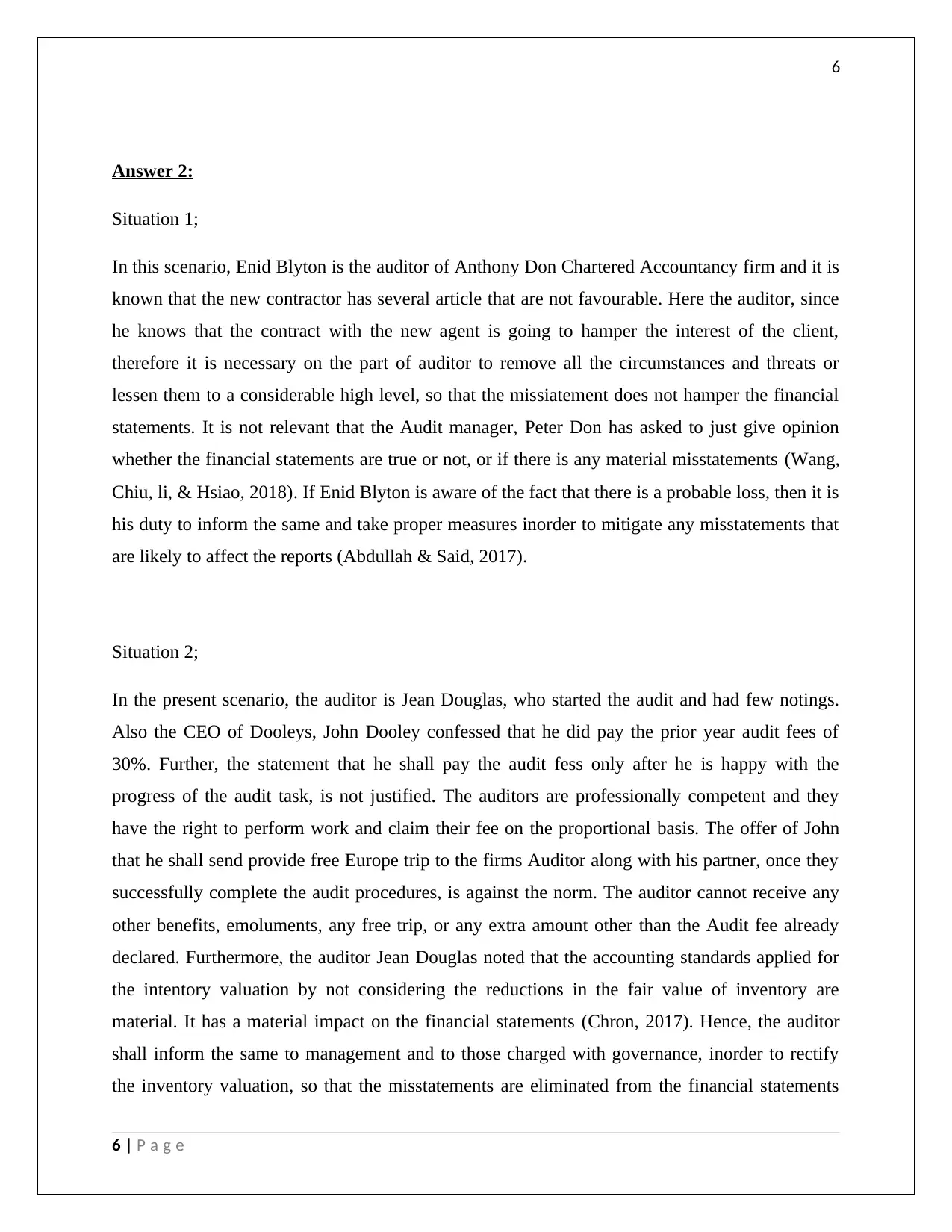
6
Answer 2:
Situation 1;
In this scenario, Enid Blyton is the auditor of Anthony Don Chartered Accountancy firm and it is
known that the new contractor has several article that are not favourable. Here the auditor, since
he knows that the contract with the new agent is going to hamper the interest of the client,
therefore it is necessary on the part of auditor to remove all the circumstances and threats or
lessen them to a considerable high level, so that the missiatement does not hamper the financial
statements. It is not relevant that the Audit manager, Peter Don has asked to just give opinion
whether the financial statements are true or not, or if there is any material misstatements (Wang,
Chiu, li, & Hsiao, 2018). If Enid Blyton is aware of the fact that there is a probable loss, then it is
his duty to inform the same and take proper measures inorder to mitigate any misstatements that
are likely to affect the reports (Abdullah & Said, 2017).
Situation 2;
In the present scenario, the auditor is Jean Douglas, who started the audit and had few notings.
Also the CEO of Dooleys, John Dooley confessed that he did pay the prior year audit fees of
30%. Further, the statement that he shall pay the audit fess only after he is happy with the
progress of the audit task, is not justified. The auditors are professionally competent and they
have the right to perform work and claim their fee on the proportional basis. The offer of John
that he shall send provide free Europe trip to the firms Auditor along with his partner, once they
successfully complete the audit procedures, is against the norm. The auditor cannot receive any
other benefits, emoluments, any free trip, or any extra amount other than the Audit fee already
declared. Furthermore, the auditor Jean Douglas noted that the accounting standards applied for
the intentory valuation by not considering the reductions in the fair value of inventory are
material. It has a material impact on the financial statements (Chron, 2017). Hence, the auditor
shall inform the same to management and to those charged with governance, inorder to rectify
the inventory valuation, so that the misstatements are eliminated from the financial statements
6 | P a g e
Answer 2:
Situation 1;
In this scenario, Enid Blyton is the auditor of Anthony Don Chartered Accountancy firm and it is
known that the new contractor has several article that are not favourable. Here the auditor, since
he knows that the contract with the new agent is going to hamper the interest of the client,
therefore it is necessary on the part of auditor to remove all the circumstances and threats or
lessen them to a considerable high level, so that the missiatement does not hamper the financial
statements. It is not relevant that the Audit manager, Peter Don has asked to just give opinion
whether the financial statements are true or not, or if there is any material misstatements (Wang,
Chiu, li, & Hsiao, 2018). If Enid Blyton is aware of the fact that there is a probable loss, then it is
his duty to inform the same and take proper measures inorder to mitigate any misstatements that
are likely to affect the reports (Abdullah & Said, 2017).
Situation 2;
In the present scenario, the auditor is Jean Douglas, who started the audit and had few notings.
Also the CEO of Dooleys, John Dooley confessed that he did pay the prior year audit fees of
30%. Further, the statement that he shall pay the audit fess only after he is happy with the
progress of the audit task, is not justified. The auditors are professionally competent and they
have the right to perform work and claim their fee on the proportional basis. The offer of John
that he shall send provide free Europe trip to the firms Auditor along with his partner, once they
successfully complete the audit procedures, is against the norm. The auditor cannot receive any
other benefits, emoluments, any free trip, or any extra amount other than the Audit fee already
declared. Furthermore, the auditor Jean Douglas noted that the accounting standards applied for
the intentory valuation by not considering the reductions in the fair value of inventory are
material. It has a material impact on the financial statements (Chron, 2017). Hence, the auditor
shall inform the same to management and to those charged with governance, inorder to rectify
the inventory valuation, so that the misstatements are eliminated from the financial statements
6 | P a g e
Paraphrase This Document
Need a fresh take? Get an instant paraphrase of this document with our AI Paraphraser
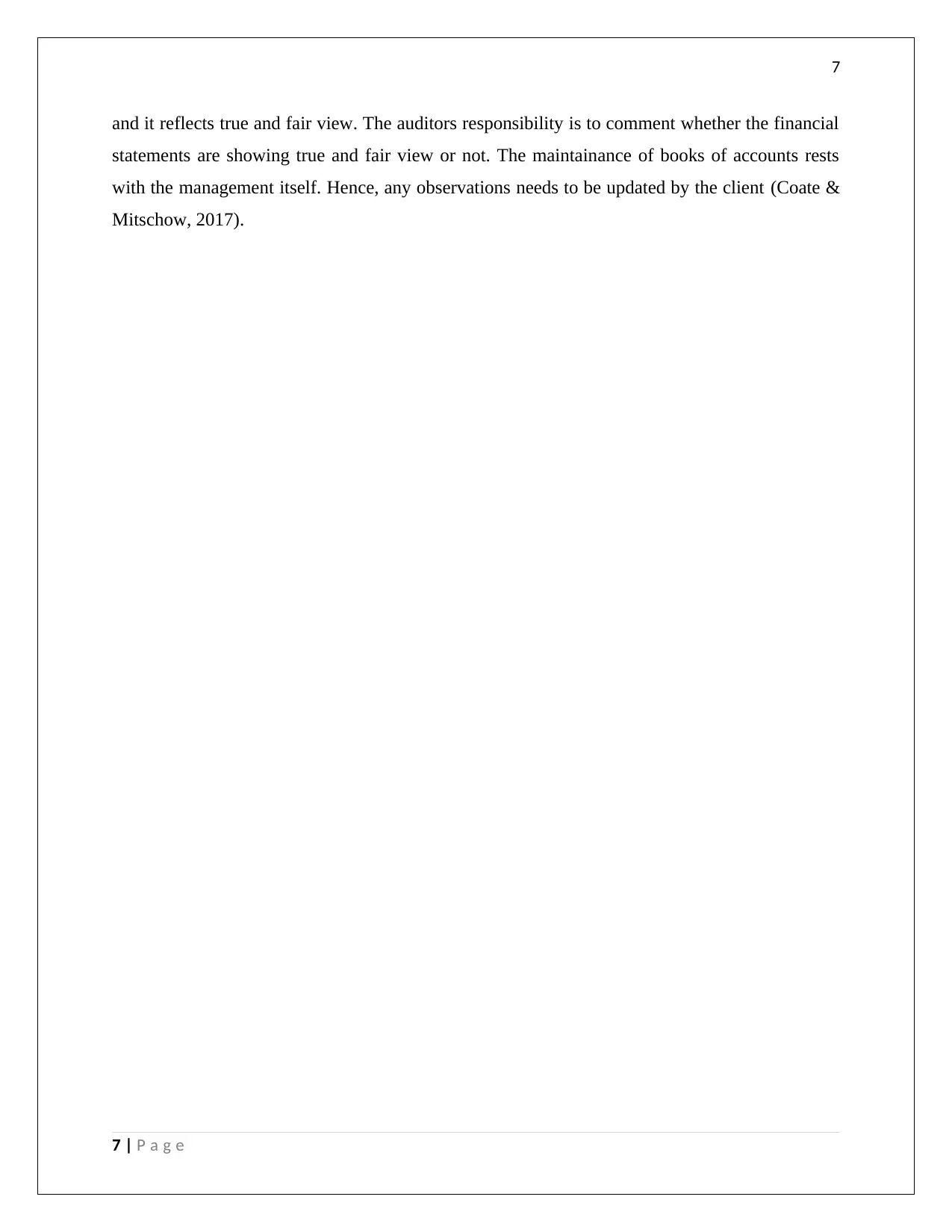
7
and it reflects true and fair view. The auditors responsibility is to comment whether the financial
statements are showing true and fair view or not. The maintainance of books of accounts rests
with the management itself. Hence, any observations needs to be updated by the client (Coate &
Mitschow, 2017).
7 | P a g e
and it reflects true and fair view. The auditors responsibility is to comment whether the financial
statements are showing true and fair view or not. The maintainance of books of accounts rests
with the management itself. Hence, any observations needs to be updated by the client (Coate &
Mitschow, 2017).
7 | P a g e
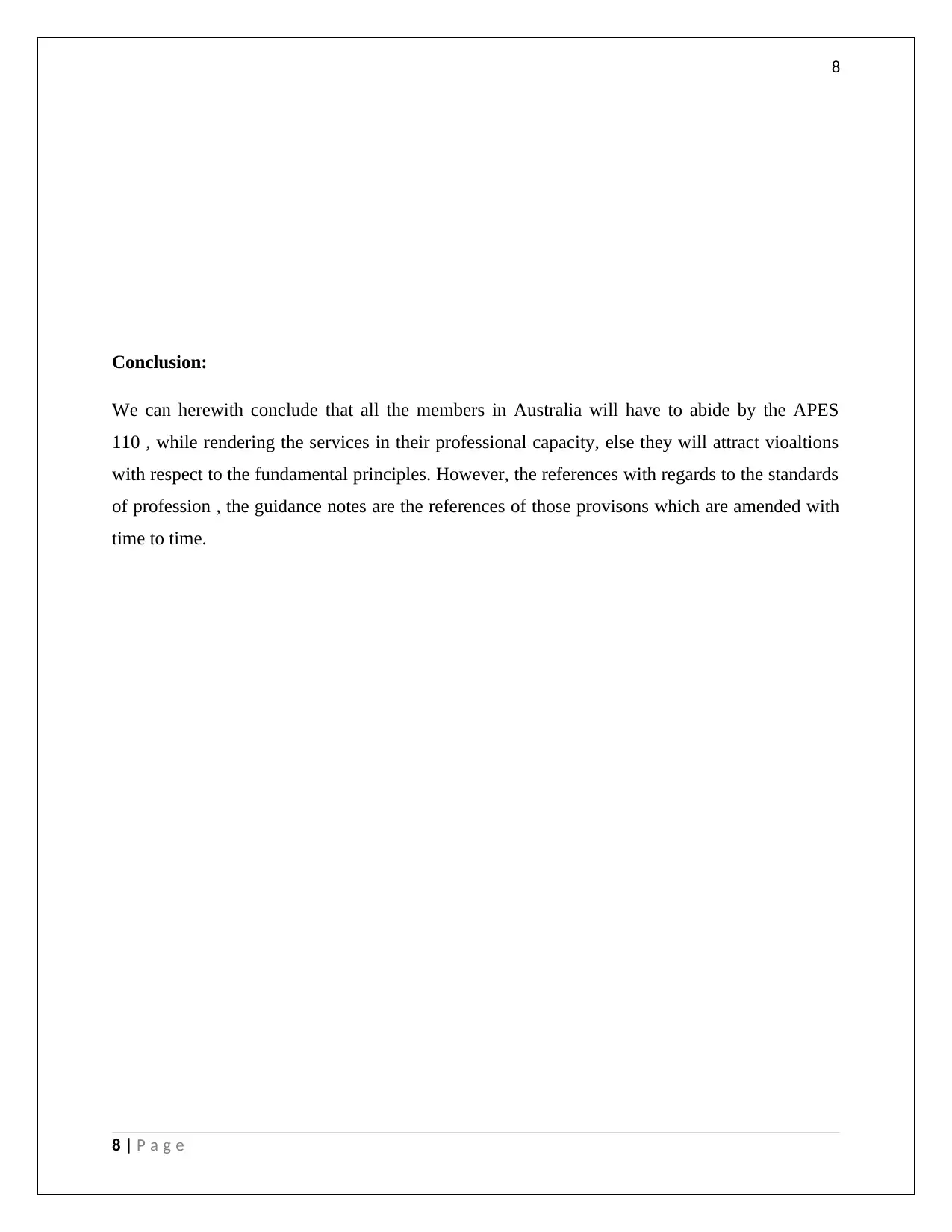
8
Conclusion:
We can herewith conclude that all the members in Australia will have to abide by the APES
110 , while rendering the services in their professional capacity, else they will attract vioaltions
with respect to the fundamental principles. However, the references with regards to the standards
of profession , the guidance notes are the references of those provisons which are amended with
time to time.
8 | P a g e
Conclusion:
We can herewith conclude that all the members in Australia will have to abide by the APES
110 , while rendering the services in their professional capacity, else they will attract vioaltions
with respect to the fundamental principles. However, the references with regards to the standards
of profession , the guidance notes are the references of those provisons which are amended with
time to time.
8 | P a g e
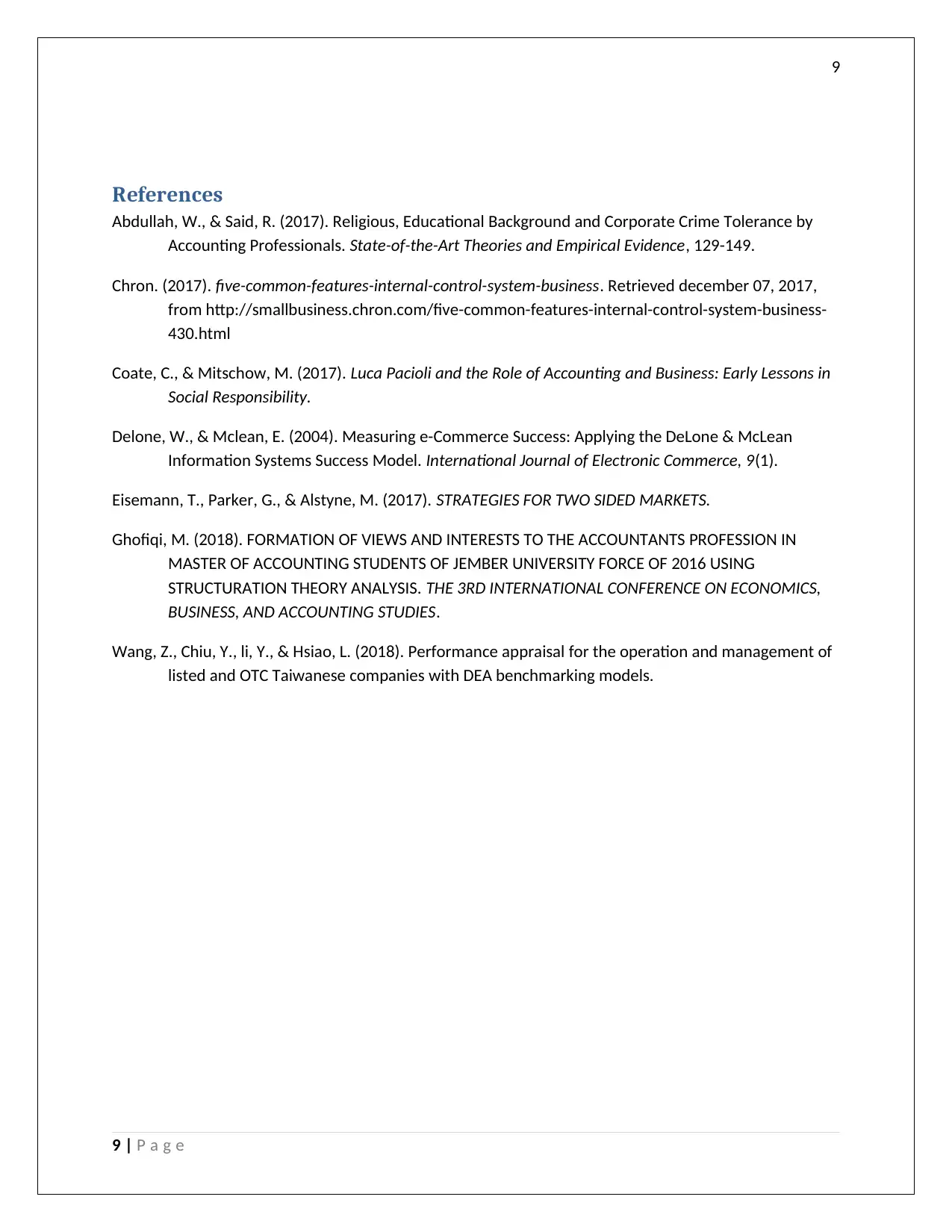
9
References
Abdullah, W., & Said, R. (2017). Religious, Educational Background and Corporate Crime Tolerance by
Accounting Professionals. State-of-the-Art Theories and Empirical Evidence, 129-149.
Chron. (2017). five-common-features-internal-control-system-business. Retrieved december 07, 2017,
from http://smallbusiness.chron.com/five-common-features-internal-control-system-business-
430.html
Coate, C., & Mitschow, M. (2017). Luca Pacioli and the Role of Accounting and Business: Early Lessons in
Social Responsibility.
Delone, W., & Mclean, E. (2004). Measuring e-Commerce Success: Applying the DeLone & McLean
Information Systems Success Model. International Journal of Electronic Commerce, 9(1).
Eisemann, T., Parker, G., & Alstyne, M. (2017). STRATEGIES FOR TWO SIDED MARKETS.
Ghofiqi, M. (2018). FORMATION OF VIEWS AND INTERESTS TO THE ACCOUNTANTS PROFESSION IN
MASTER OF ACCOUNTING STUDENTS OF JEMBER UNIVERSITY FORCE OF 2016 USING
STRUCTURATION THEORY ANALYSIS. THE 3RD INTERNATIONAL CONFERENCE ON ECONOMICS,
BUSINESS, AND ACCOUNTING STUDIES.
Wang, Z., Chiu, Y., li, Y., & Hsiao, L. (2018). Performance appraisal for the operation and management of
listed and OTC Taiwanese companies with DEA benchmarking models.
9 | P a g e
References
Abdullah, W., & Said, R. (2017). Religious, Educational Background and Corporate Crime Tolerance by
Accounting Professionals. State-of-the-Art Theories and Empirical Evidence, 129-149.
Chron. (2017). five-common-features-internal-control-system-business. Retrieved december 07, 2017,
from http://smallbusiness.chron.com/five-common-features-internal-control-system-business-
430.html
Coate, C., & Mitschow, M. (2017). Luca Pacioli and the Role of Accounting and Business: Early Lessons in
Social Responsibility.
Delone, W., & Mclean, E. (2004). Measuring e-Commerce Success: Applying the DeLone & McLean
Information Systems Success Model. International Journal of Electronic Commerce, 9(1).
Eisemann, T., Parker, G., & Alstyne, M. (2017). STRATEGIES FOR TWO SIDED MARKETS.
Ghofiqi, M. (2018). FORMATION OF VIEWS AND INTERESTS TO THE ACCOUNTANTS PROFESSION IN
MASTER OF ACCOUNTING STUDENTS OF JEMBER UNIVERSITY FORCE OF 2016 USING
STRUCTURATION THEORY ANALYSIS. THE 3RD INTERNATIONAL CONFERENCE ON ECONOMICS,
BUSINESS, AND ACCOUNTING STUDIES.
Wang, Z., Chiu, Y., li, Y., & Hsiao, L. (2018). Performance appraisal for the operation and management of
listed and OTC Taiwanese companies with DEA benchmarking models.
9 | P a g e
1 out of 10
Related Documents
Your All-in-One AI-Powered Toolkit for Academic Success.
+13062052269
info@desklib.com
Available 24*7 on WhatsApp / Email
![[object Object]](/_next/static/media/star-bottom.7253800d.svg)
Unlock your academic potential
© 2024 | Zucol Services PVT LTD | All rights reserved.




